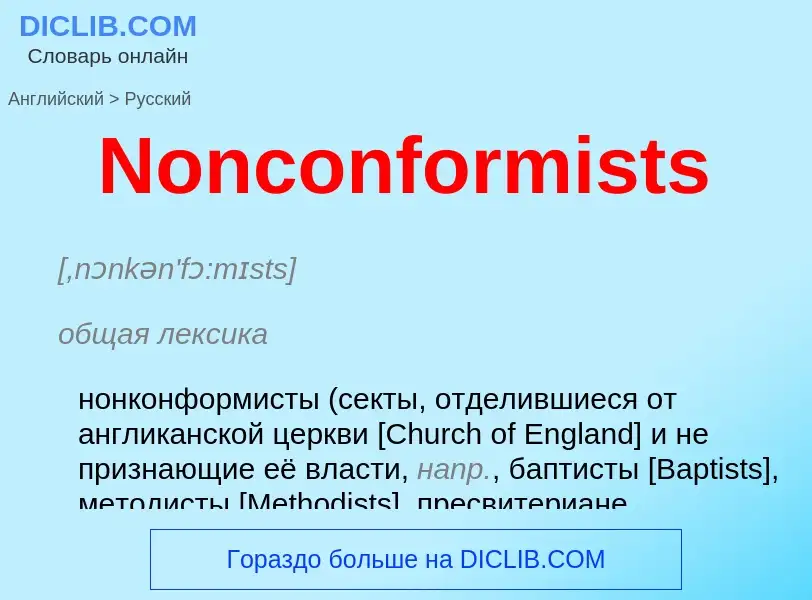Traducción y análisis de palabras por inteligencia artificial ChatGPT
En esta página puede obtener un análisis detallado de una palabra o frase, producido utilizando la mejor tecnología de inteligencia artificial hasta la fecha:
- cómo se usa la palabra
- frecuencia de uso
- se utiliza con más frecuencia en el habla oral o escrita
- opciones de traducción
- ejemplos de uso (varias frases con traducción)
- etimología
Nonconformists - traducción al ruso
[,nɔnkən'fɔ:mɪsts]
общая лексика
нонконформисты (секты, отделившиеся от англиканской церкви [Church of England] и не признающие её власти, напр., баптисты [Baptists], методисты [Methodists], пресвитериане [Presbyterians])
[nɔnkən'fɔ:mist]
прилагательное
общая лексика
(Nonconformist) [церк.] диссидентский
сектантский
раскольнический
не признающий традиций
оригинальный
оригинальничающий
фрондёрский
бунтарский
существительное
[nɔnkən'fɔ:mist]
общая лексика
(Nonconformist) [церк.] диссидент
сектант
раскольник
нонконформист
фрондёр
оригинал
инакомыслящий
инаковерующий
бунтарь
сектант, диссидент
синоним
Wikipedia

In English church history, the Nonconformists are Protestant Christians who did not "conform" to the governance and usages of the established church, the Church of England (Anglican Church). Use of the term in England was precipitated after the Restoration of the Stuart monarchy in 1660, when the Act of Uniformity 1662 renewed opposition to reforms within the established church. By the late 19th century the term specifically included other Reformed Christians (Presbyterians and Congregationalists), plus the Baptists, Brethren, Methodists, and Quakers. The English Dissenters such as the Puritans who violated the Act of Uniformity 1559 – typically by practising radical, sometimes separatist, dissent – were retrospectively labelled as Nonconformists.
By law and social custom, Nonconformists were restricted from many spheres of public life – not least, from access to public office, civil service careers, or degrees at university – and were referred to as suffering from civil disabilities. In England and Wales in the late 19th century the new terms "free church" and "Free churchman" (or "Free church person") started to replace "Nonconformist" or "dissenter".
One influential Nonconformist minister was Matthew Henry, who beginning in 1710 published his multi-volume Commentary that is still used and available in the 21st century. Isaac Watts is an equally recognised Nonconformist minister whose hymns are still sung by Christians worldwide.
The term Nonconformist is used in a broader sense to refer to Christians who are not communicants of a majority national church, such as the Lutheran Church of Sweden.


![Bunyan Meeting Free Church, a Nonconformist [[chapel]] in [[Bedford]]. Dissenter [[John Bunyan]] purchased a barn in 1672 for a meeting place. A [[meeting house]] replaced it in 1707 and this chapel was built in 1850. Bunyan Meeting Free Church, a Nonconformist [[chapel]] in [[Bedford]]. Dissenter [[John Bunyan]] purchased a barn in 1672 for a meeting place. A [[meeting house]] replaced it in 1707 and this chapel was built in 1850.](https://commons.wikimedia.org/wiki/Special:FilePath/Bunyan Meeting Free Church - geograph.org.uk - 809801.jpg?width=200)
